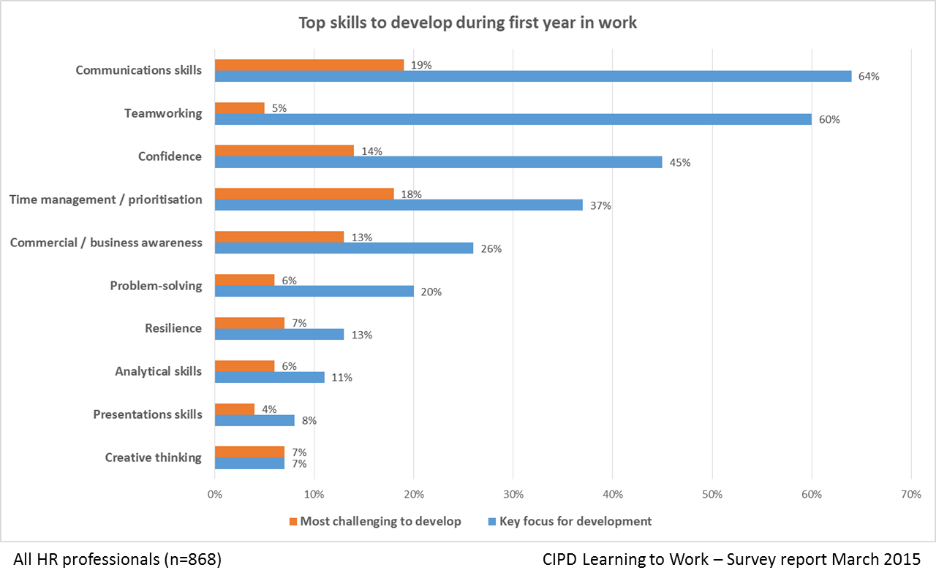Business and Soft Skills Development
Would you like to attract, recruit, develop and retain more young people for your company?
Then you have come to the right place!
Research says
-
1 in 4 graduates is likely to leave their first employer within 12 months (CEB[i]).
-
SMEs (~50%) lag behind large employers (86%) when it comes to employing at least one young person, despite providing 3 out 5 private sector jobs (CIPD[ii]).
-
6 out of 10 (63%) employers are concerned about low levels of skills being the biggest threat to the UK’s competitiveness as a place to employ people (CBI[iii]).
- In the United Kingdom 5 out of 6 (83%) employees are not engaged or actively disengaged. This is only slightly better than the worldwide average (Gallup[iv]).
That means
Companies whose employees have misaligned expectations and mismatched skills, will result in lower engagement and suffer:
-
poorer customer opinion, which will result in lost business because of potential customers going to your competitors.
-
reduced profitability, which will limit your ability to invest for the future of your business.
-
decreased productivity, which will slow the growth of your company.
-
higher employee churn, which will increase recruitment and staff development costs.
-
more employee days off, which will increase the workload of colleagues and create additional organisational challenges for management.
This is tragic but totally avoidable, as you will see.
Your solution
Recent research published by the CIPD as part of the Learning to Work programme[v] focuses on today’s young people being tomorrow’s workforce. It lists the key and most important skills that must be developed in the first year of employment.

In the survey, 4 out of 10 businesses responding were SMEs, so this is just as critical to SMEs as for larger companies.
Four of the top reasons that employees leave their job are the lack of:
- genuine interest in their development.
- skills development and opportunities to utilise their skills, expertise and abilities.
- recognition for the contribution they make.
- promotion and career progression.
For inexperienced young employees, it is critical to lay down a solid foundation on which to build their career. If you help them to get this right from the start, then you will build trust and loyalty which will lead to them staying with you for the long term.
Not doing this could result in your young employee being the 1 in 4 who leaves your company in the first year.
This will be a massive cost to your company in terms of both time and money:
-
Advertising for a new recruit
-
Sifting through mountains of CV’s
-
Selecting for interview
-
The interview process
-
Induction training
Business and soft skills development training
The best way to address the development of these business and soft skills is to provide your young employees with a programme designed specifically for young people, rather than mixing them in with your experienced employees.
Due to their inexperience and lack of confidence they will benefit from a graduate-style tailored development programme that will enable them to develop and grow at the right pace, without being overshadowed by their more experienced colleagues.
With only half of large employers and just 1 in 9 SMEs currently providing a graduate programme[vi], you have a great opportunity to differentiate your company by offering a graduate-style development programme, and attracting top calibre graduates.
It costs money to provide a graduate programme, and is sometimes difficult to quantify the value of it during their first 18-24 months development, however BMW believe they do get real value out of this investment. In particular, it helps with retention of the graduates and very few – below industry average – leave BMW during their early career.
You don’t have to have the HR/L&D people, expertise, space or deep pockets to provide one, as you can outsource the business and soft skills development of your young employees.
Business benefits for you:
- Attract better calibre young people with a comprehensive graduate-style development programme.
- Rapidly integrate your new employees into their team and department.
- Accelerate performance from new recruits, and make them more productive.
- Retain employees for longer, thereby avoiding massive costs in terms of both time and money.
Employee benefits for them:
- See their self-confidence grow so they take more initiative in the workplace.
- Develop the ability to ask better, more critical questions of the people they meet.
- Develop essential skills that will form a solid foundation on which to build their career.
- Gain an understanding of leadership and how to lead.
- Increase promotion and career prospects, and experience greater responsibility and higher income.
These are the reasons why we created the GradStart™ programme, to support businesses just like yours, and ensure that your young employees are effective, productive and a valuable member of your team – right from the start.
[i] CEB/SHL Talent Measurement: Hire and Inspire – A new approach to Graduate recruitment 2014
[ii] CIPD: Learning to Work – Survey report March 2015
[iii] CBI/Accenture: Growth for Everyone: Employment trends survey 2014
[iv] Gallup: State of the Global Workplace: Employee Engagement Insights for Business Leaders Worldwide 2013
[v] CIPD: Learning to Work – Survey report March 2015
[vi] CIPD: Learning to Work – Survey report March 2015

